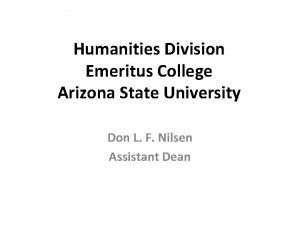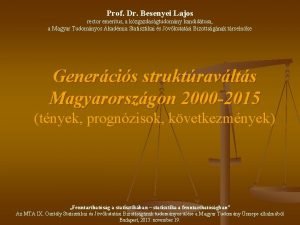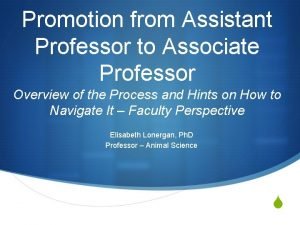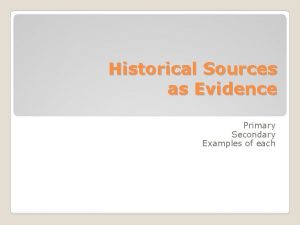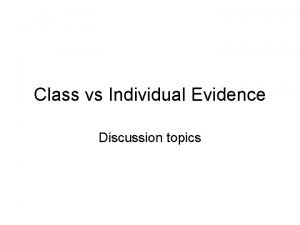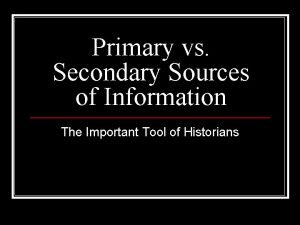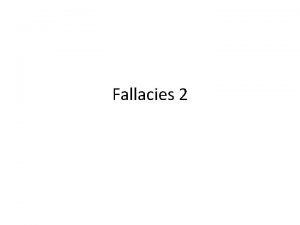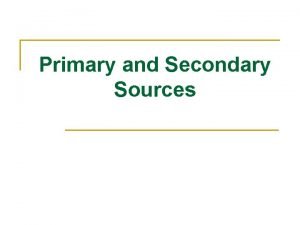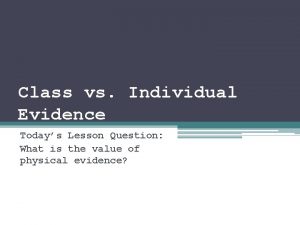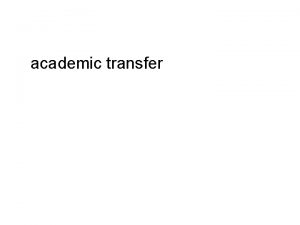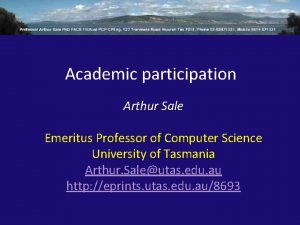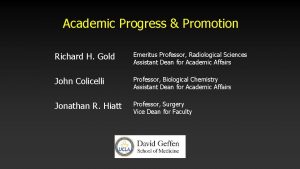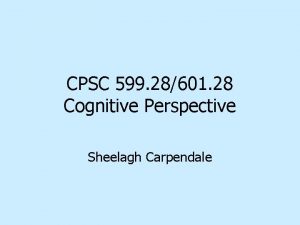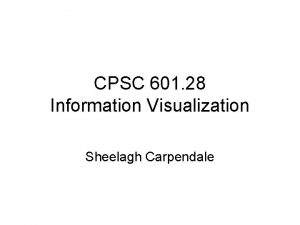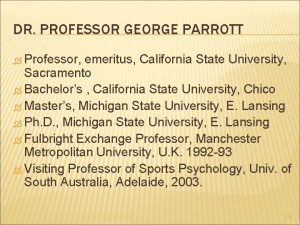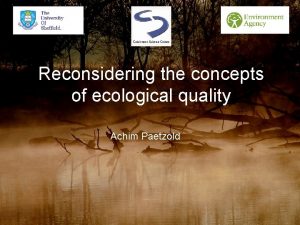Reconsidering Evidence in Academic Quality Emeritus Professor Sheelagh











- Slides: 11

Reconsidering Evidence in Academic Quality Emeritus Professor Sheelagh Matear Academic Quality Agency for New Zealand Universities

Presentation outline • Review of evidence in academic quality • Types of evidence • Quality of evidence • Why we need to have another look at evidence • New Zealand context • Data proliferation • Conclusions • Suggested guidelines

Evidence in academic quality • Documents such as existing policies, reports and analyses, principally from internal sources; • Statistical evidence from internal and, where appropriate, external sources; • Oral evidence collected during the self-review or audit process; and • Might also derive from samples of the available information or from tracking audit trails. • Pre-existing or bespoke • Quantitative or qualitative • For or from other functional areas, individuals, groups or knowledge systems

Quality of evidence – what is good evidence • Relevant, representative, verifiable, cumulative, actionable (WASC 2002, 2015) • Contextual, holistic (QAA Scotland 2017) • Triangulated (Cameron 2013)

Why is the New Zealand context prompting a re-think? • New cycle of academic audit • 2017 – 2023 • Audit phase commences 2021 • Explosion in data • Learning analytics Aotearoa, New Zealand

Cycle 6 Academic Audit – 10 components A. Maintain an internationally referenced, cyclical, peer-review model of external quality assurance. B. Maintain a high-trust, enabling, relationship between the universities and AQA that recognises and respects universities’ responsibility and accountability for quality as well as AQA’s Terms of Reference and independence. C. Maintain the scope of academic audit on teaching, learning, support and outcomes for students. D. Build on and refresh the Cycle 5 academic audit framework (guideline statements) and further emphasise outcomes and the use of evidence. E. Incorporate a thematic enhancement topic agreed by all universities that will address an issue that is both a strategic priority for universities and of national importance. The enhancement theme topic for Cycle 6 is “Access, outcomes and opportunity for Māori students and for Pasifika students”. F. Audit universities 7 -8 years after their Cycle 5 audit. G. Include students or recent graduates in audit panels. H. Amend the audit delivery method so that Panels spend more time together initially and that time spent at the university can be more targeted and require meeting with fewer individuals. I. Develop audit reports to comment on outcomes and enhancement initiatives, as well as processes. J. Include a public report on a university’s response to recommendations. A mid-cycle follow-up report on Cycle 5 recommendations will be introduced.

Cycle 6 Audit Framework (30 Guideline statements across 5 sections) Students Postgraduate research students Cycle 6 Academic Audit Framework Teaching Curriculum Leadership and Management Self-review portfolios should reflect: University obligations under Te Tiriti o Waitangi The interdependence of university research and teaching Universities’ role as critic and conscience of society All delivery: in-person, international, trans-national, distance, mobile All staff who undertake or support teaching or supervision All students

Implications for evidence • Relevance • To the guideline statement • To the embedded or systemic nature of quality • Representative • Of the direction of change • Verifiable, able to be triangulated, cumulative • Reflecting the complex nature of academic quality • Actionable • At disaggregate levels to uncover opportunities for improvement • Contextual • Reflect the characteristics and priorities of the university

Conclusions – guidelines for evidence • Context - what is appropriate evidence for one university may not be for another. • The majority of evidence presented in Cycle 6 will be pre-existing evidence. • Evidence should be explicit and sufficient, relevant, representative, verifiable, cumulative, actionable, contextual and holistic and able to be triangulated. • The most important criterion for evidence is relevance. In Cycle 6 this means relevance of the evidence to the guideline statement and relevance to the embedded or systemic nature of evidence. • Evidence can be strengthened by drawing on multiple perspectives and sources from across the university. • Tensions are likely to exist between the pre-existing nature of evidence and relevance of that evidence, and need to be resolved. • Evidence should reflect a longitudinal component to reflect the direction of change. • Evidence may take a variety of forms and some evidence may be based on indigenous knowledge systems.

Thank-you for listening. Any questions? director@aqa. ac. nz www. aqa. ac. nz

References • Cameron, J. (2013). Cycle 5 Academic Audit Handbook for Universities, AQA. Retrieved from http: //www. aqa. ac. nz/sites/all/files/AQA%20 Cycle%205%20 Academic%20 Audit %20 Handbook%20 v 1. pdf • QAA-Scotland. (2017). Enhancement-led Institutional Review Handbook. Retrieved from http: //www. qaa. ac. uk/docs/qaas/reviewing-he-in-scotland/elir 4 handbook-2017. pdf • Western Association of Schools and Colleges (WASC) (2002). Evidence Guide - A Guide to Using Evidence in the Accreditation Process: A Resource to Support Institutions and Evaluation Teams. Accrediting Commission for Senior Colleges and Universities: Western Association of Schools and Colleges. • Western Association of Schools and Colleges (WASC) (2015). Using Evidence in the WSCUC Accreditation Process: A Guide for Institutions. Retrieved from https: //www. wscuc. org/content/using-evidence-wscuc-accreditation-processguide
 As jamal develops his presentation
As jamal develops his presentation Regents professor emeritus
Regents professor emeritus Asu emeritus college
Asu emeritus college Rector emeritus
Rector emeritus Promotion from assistant to associate professor
Promotion from assistant to associate professor Primary evidence vs secondary evidence
Primary evidence vs secondary evidence Class and individual evidence
Class and individual evidence Primary evidence vs secondary evidence
Primary evidence vs secondary evidence Why are fibers considered class evidence
Why are fibers considered class evidence The ecological fallacy
The ecological fallacy Secondary sources
Secondary sources Class evidence vs individual evidence
Class evidence vs individual evidence


